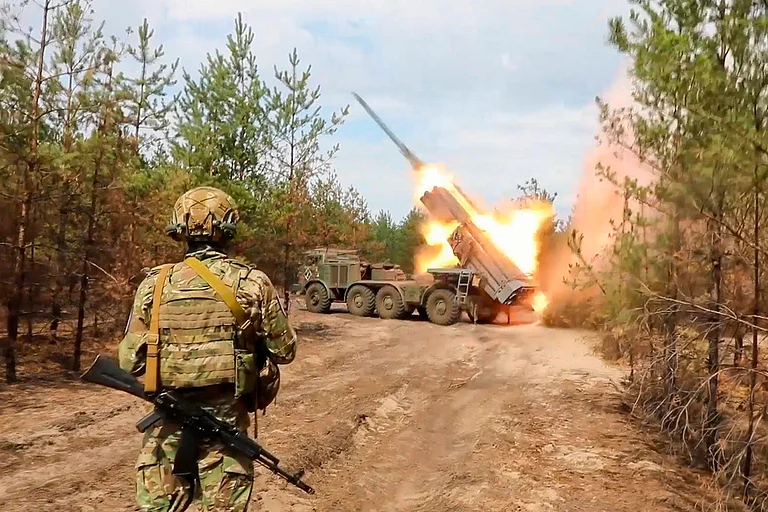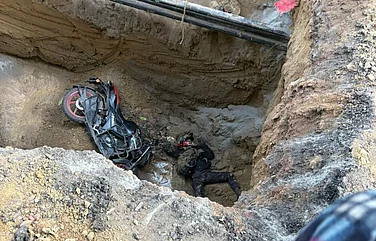THE euphoria in Delhi is understandable. A 49 per cent voter turnout in the Baramulla and Anantnag Lok Sabha constituencies in the Kashmir Valley is no doubt impressive—a dramatic five-fold increase in votes from the 1989 figure. But even as the state administration, the security forces and other managers of the May 23 polls are patting themselves on the back for the remarkable success, accusations abound that the turnout was stagemanaged, and that the security forces worked in tandem with surrendered militant groups to coerce a sizeable section of voters to exercise their franchise. The role of forces and other managers of the May 23 polls are patting themselves on the back for the remarkable success, accusations abound that the turnout was stagemanaged, and that the security forces worked in tandem with surrendered militant groups to coerce a sizeable section of voters to exercise their franchise. The role of the security forces ever since polls were announced has been such that doubts persist on whether the elections were 'free and fair'.
Already Ghulam Rasool Kar, the state Congress chief and candidate from Baramulla, has complained to the Election Commission that gun-wielding men had captured 50 of the 66 polling stations in Pattan. Kar alleges that his polling agents were prevented from entering polling stations at Sopore. At Sonaware, the returning officers were directing voters to vote BJP. Kar wants a repoll in all these segments. The National Conference (NC), which boycotted the elections, is also preparing its protest to the EC.
Points out Saifuddin Soz, official spokesman of the NC: "These elections were full of irregularities. Everything was allowed to hap-pen in the 'national' interest. So you have this manoeuvred percentage to prove a high turnout. This was achieved through a fear psychosis spread by a section of the army, particularly the Rashtriya Rifles (RR). Now they want us to believe that the voter-response was higher than in Gujarat."
There is enough evidence to suggest that to achieve 'outstanding' voter-response, the security forces did resort to various forms of persuasion to hustle reluctant men and women to polling booths. Any observer who toured the two constituencies on May 23 minus Government public relations bifocals will tell you that the impressive turnout was rather suspect and that the efforts of the security agencies to pressurise people to vote was not entirely democratic.
In village after village this correspondent visited, the story was the same. Crowds of people squatted outside polling stations like herds of sheep. One question, and all sprung to life with their complaints. The common thread in their stories was that members of the RR, a force created to manage counter-insurgency operations, had made announcements from the mosque asking everyone to vote. This was followed up by house-to-house visits by jawans of the RR and the paramilitary. The message was that dire consequences awaited those who refused to vote. In many villages the security forces warned that the index finger of those above 18 would be inspected to see if it has the indelible voter mark.
Outside Anantnag, at the Dialgam village's polling station in the Government Higher Secondary School, a crowd of about 300 male voters had lined up outside the booth by 8.30 am. They said it was pressure from the RR stationed in their village that had forced them to come to vote. Even when interviewed individually, the refrain was similar: an RR Major had asked the local mulla to announce from the mosque at about 6 am that everybody should vote. Later, RR men came to their houses and told them that they would be beaten up if they did not cast their votes.
But, it was not as if everybody was against the polls. Some senior citizens said they did not see any point in voting because they could think of no candidate worth electing. Since they had been coerced, they would vote for all candidates: "Our policy is to vote for everyone. Everyone will be happy and the army will leave us in peace."
A few kilometres down the road at Bunadayalgam, the response was quite similar. A J&K police officer patrolling the area agreed that the common complaint of the people was that they had been forced into voting but said that he could not comment on any action involving the RR. As for the voters, a size-able section of them wished to be heard and their view is that they had merely come to vote to stay clear of trouble.
But not all the villagers are as docile. At Malangpora, close to Pulwama, a district town, Shubhan Krishen Tickoo—the Anantnag candidate of the Awami League, a political front of the surrendered militant group Ikhwan-ul-Muslimoon—was surrounded by irate villagers who impressed upon him that they had nothing to do with an election in which people like him were contesting. Tickoo was on a tour of his constituency and had nothing to say about the RR and his men threatening people who had not voted. In this village, those who did not vote were told that they would be asked to sit in a trough of cold water through the night. "One swallow does not a summer make. This is an odd incident," Tickoo countered.
About three kilometres out of Pulwama in Machbana village, the entire community—men, women and children included—was out protesting against RR atrocities in the morning. So agitated were the villagers that they were even ready to assault the press party since it represented the Government in Delhi. The protesters wanted to make it very clear they were totally opposed to any election imposed with the help of the gun.
IN Anantnag town the surrendered militant groups, Muslim Mujahideen, the JK Ikhwan of south Kashmir and the Ikhwan-ul-Muslimoon, were out in full force. And although army corpscommander, Maj. Gen. J.S. Dhillon, had on the day before elections categorised surrendered militants as those who have given up arms, there were armed civilians moving about in the town in vehicles. In booth No. 46 Mushtaq Ahmed, the polling agent of the JK Ikhwan-sponsored Independent candidate, Abdul Rashid Misgar, admitted that force was used to bring the voters out of their homes. Said he: "If you don't use force there can be no elections here." In another polling centre in Anantnag, a surrendered militant was found inside the booth. He shied away from the press.
Many polling centres in the Anantnag constituency were conspicuous by the absence of any polling agent from any other party other than those sponsored by surrendered militants. Though he had no complaints about the elections, the Congress candidate from Anantnag, Taj Mohi-ud-Din, pointed out that his polling agents refused to go to the booths out of fear of the Ikhwan militants.
What transpired in Anantnag found clear echoes in Baramulla. Here again, the RR and some of the paramilitary forces heaped discredit on themselves in trying to achieve a high voter turnout. In Baramulla town, voters whose names did not figure on the list were actually herded into the polling booth and given a mark on their index finger so that they would not be troubled by the security forces later.
In Sopore, which is identified as a sensitive area, the press parties were subjected to the same complaints of RR excesses. It was remarkable that unlike in the rest of the country a crowd of disgruntled voters were present at almost every polling booth. Many said that they had been waiting since morning. No one in Sopore looked like they had come on their own free will to vote. The response from the people in Pattan and Delina was also quite similar.
When confronted by the charge that the RR and the security agencies seemed to have overstepped their brief of "creating an atmosphere conducive to elections", Jammu and Kashmir Chief Secretary Ashok Kumar denied it outright that there had been any pressure on the people to vote. When cornered by examples and eyewitness accounts, his only explanation was that the people out of fear of pro-Pakistan militants may have been unwilling to admit that they had come out on their free will and had therefore conveniently put the blame on pressure from the security forces. This, incidentally, was the same explanation provided by Hilal Hyder, a leader of the surrendered militant group Al-Ikhwan. Hyder's men were quick to hide their weapons as he categorically denied the use of the gun in Anantnag town.
But there was no way the chief secretary or the chief election officer, J.A. Khan, could explain how those below the age of voting had actually cast their votes in both Baramulla and Anantnag constituencies. Neither could Khan account for the lack of secrecy in many of the polling booths where the voters had to stamp their choice on the ballot paper in the presence of the polling officer and sometimes under the watchful eyes of surrendered militants.
However, it is the security forces who tarnished their image through their role in the May 23 elections. And this comes at a time when the Army had just time when the Army had just managed to marginalise the pro-Pak militant groups. In fact, it goes to the credit of the Army and the paramilitary that the level of violence which was expected during the build up to the elections actually did not take place. The Hizbul Mujahideen also failed to disrupt the elections.
There is one school of opinion in Srinagar that, under the circumstances, the poll would have been a major boost for the authorities had it not been marred by the overzealousness of those who wanted an impressive poll percentage. Points out Soz: "Even without all the coercion, about 15 per cent people would have voted and it may have been described as a free and fair poll and a positive step. What is wrong with a 15 per cent turnout? But the opportunity seems to have been wasted away in this percentage game."
In fact, a fortnight before the polls officials in the state administration admitted that a 20 per cent turnout was what they were working towards. Candidates of political parties like the Congress, Janata Dal and the BJP expected no more than 25 per cent votes to be cast. Now they admit that it was a forced turnout. But they are waiting for the results on June 3, after which many of them will voice their grievances, for those who expect to win do not want to risk a repoll as a result of complaints to the EC.
The obvious effort of the The obvious effort of the Government was to prove to the world that the people of Kashmir are all for democracy. There is no doubting that there is a growing sentiment which is opposed to the gun culture of the militants. People have also lost faith in Pak-sponsored insurgency which has disrupted normal life in the Valley for the last seven years.
But the goodwill earned through its operations seems to have been squandered by the state administration's unleashing of surrendered militants who, ironically, continue to wield their guns. To add to this, some of these militants were even allowed to contest the elections and their presence made it difficult for most candidates not backed by surrendered militant groups to campaign.
The elections, which at one level was managed by forcing voters to the polling booths to achieve a high turnout percentage, is being described by some army officers as a PR exercise aimed to impress the nation and the world and thus may be taken with a pinch of salt. However, the Government could have reasons to celebrate the 'voter response' as a first step towards establishing democratic governance in the Valley, however controversial that first step may be.






















